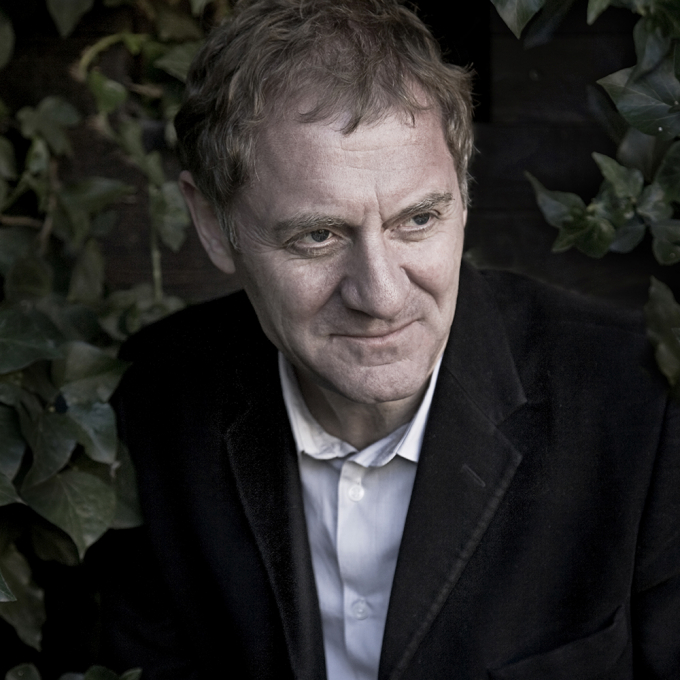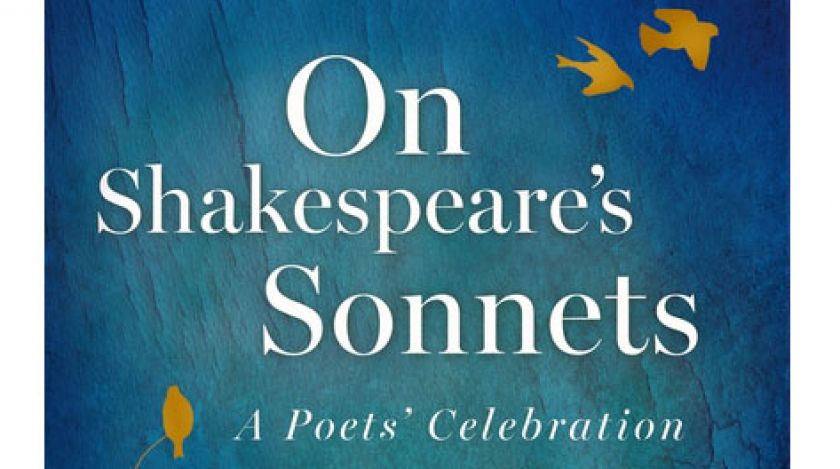
- ©
- Johnny Ring
Biography
Professor Andrew Motion was born in London on 26 October 1952, and read English at University College, Oxford.
He taught English at the University of Hull (1976-81) where he met the poet Philip Larkin. He was editor of Poetry Review (1981-83) and was Poetry Editor and Editorial Director at London publishers Chatto & Windus (1983-89). He succeeded Malcolm Bradbury as Professor of Creative Writing at the University of East Anglia and was Professor of Creative Writing at Royal Holloway, University of London before moving to Johns Hopkins University in America. He is a Fellow of the Royal Society of Literature. He has been Chairman of the Arts Council of England's Literature Panel since 1996.
An acclaimed poet (and champion of poetry), critic, biographer and lecturer, Andrew Motion became Poet Laureate in 1999, succeeding Ted Hughes and preceding Carol Ann Duffy, He was awarded the Newdigate Prize at Oxford for his poem 'Inland', included in his first collection of poems, The Pleasure Steamers, published in 1977. His poetry collections include Independence (1981); Secret Narratives (1983); Dangerous Play: Poems 1974-1984 (1984), which won the Mail on Sunday/John Llewellyn Rhys Prize; Natural Causes (1987), which won the Dylan Thomas Award; The Price of Everything (1994); Salt Water (1997) and Selected Poems 1976-1997 (1998); and Public Property (2002). His collection of poems was The Cinder Path (2009), shortlisted for the 2010 Ted Hughes Award for New Work in Poetry.
Andrew Motion is also the author of several acclaimed biographies including The Lamberts: George, Constant and Kit (1986), which won a Somerset Maugham Award; Philip Larkin: A Writer's Life (1993), which won the Whitbread Biography Award; a life of John Keats published in 1997; and Wainewright the Poisoner (2000), an account of the life of Thomas Wainewright, critic, forger, painter and suspected murderer. He has also written a short novel, The Invention of Dr Cake, which combines elements of mystery and detective fiction, and was published in 2003. His memoir, In The Blood, was published in 2006, and a selection of his autobiographical and critical writings, Ways of Life: On Places, Painters and Poets in 2008.
Andrew Motion lives in London and received a knighthood in 2009. His latest book is Peace Talks (2015).
Critical perspective
Award-winning biographer and poet, with a career stretching over four decades, Motion will always be remembered for his decade as Poet Laureate.
Often seen as a thankless post, it was one that he grasped with notable vigour. As he declared, it was as much about promoting the poetry of others as himself: "I see myself as a town-crier, can-opener and flag-waver for poetry, as well as wanting to write poems about various events that seem suitable to me."
Yet he was also cautious about taking the role, and rightly so, since the inevitable compromises of his stint under royal patronage has enabled people- unfairly- to dismiss his large body of often low-key critical, poetic and biographical writings.
There are two prevailing views on Motion. The first is that he is the Establishment made flesh, a traditionalist whose devotion to the conservative English lineage of Edward Thomas made him a dispiriting choice for champion of British poetry as it entered a new millennium. Motion has certainly always striven to be understood, claiming that “I want my writing to be as clear as water… no ornate language; very few obvious tricks. I want readers to be able to see all the way down through its surfaces into the swamp.” But some have seen his style as simply too transparent, and his range of concerns free from any empowering irony or bite.
Yet there is a second view, one that has grown in currency since he ended his stint as laureate in 2009. That is of a subtler poet with a flair for enigmatic narrative verse that is observant, empathetic, unsentimental, and metrically useful. Whose work offers a muted investigation into recent British history that is just as ‘public’ and civic as his laureate compositions. Someone who is drawn not just to a dialogue with the Englishness of Auden and Larkin but with the persona, games and layers of irony of Bob Dylan, who Motion calls “one the great artists” of the twentieth century, and whose writing on Blonde on Blonde helped show the young poet what poetry could be.
This richer second side to Motion comes out strongly at various points in his career. The first notable works were the series of lyric poems he wrote about his mother’s tragic accident falling from a horse and never fully recovering, when the poet was only 16. They were collected in The Pleasure Steamers (1976) that recalled moments such as her failing to return from the ride:
"What I remember is not
your leaving, but your not
coming back …
And I am still there,
seeing your horse return
alone to the open stable,
its reins dragging behind
a trail across the plough,
a blurred riddle of scars
we could not decipher then,
and cannot heal now."
"For most people," he wrote, "childhood ends slowly... But my childhood had ended suddenly." It became the defining moment of his life… “It made me feel the only sensible cast of mind to have was a profoundly elegiac one”. And elegy was to become one of Motion’s key modes, exploring nostalgia through understatement and emotional subtlety.
The most celebrated poem of his pre-Laureate period was probably ‘Lines Of Desire’ from the collection Price of Everything (1994). That poem was a long ambitious work that weaved together his father’s remembrances of World War Two with Motion’s own childhood experiences on the Essex/Suffolk border, dreams, and memories of watching the Berlin Wall fall. All are presented as different routes to what the poem calls “a big language”:
“A moment ago he would have sworn everything looked like home – like Essex! But when he turns off the road into a field it is not like Essex at all. On the bank of a stream is a soldier’s fair-haired head with no jaw to it, no mouth. This is all he can find.
*
I wanted a big language for the people who died –
I wanted a big language for fighting. I found one
but only when peace descended; then I looked back
and the apple-roads, my vanished brothers-in-arms,
the ruined flickering outskirts of the capital, a dead dog in a pram, the enormous iron station with its roof blown off, the herderd people
all were part of my big language”
As Motion shifts from the imagery of poison gas over France to the hunting of a hare, he combines the personal, political and national in a manner that is engrossing and jarring. Then came the Laureate phase, a chapter that Motion admits he felt stifled by. There was criticism from the poetry community- some of it very vocal when he was appointed. The criticism is part of the role, of course, and Motion rose above it to transform the Laureateship into a vehicle for the promotion of poetry more broadly, helping to set up the Poetry Archive website and championing poetry in schools.
Nonetheless, as feared, the pressure of public commissions exerted quite a toll on the quality of his output. The most notorious of his offering during this period was his 2003 hip hop rap for William’s 21st birthday, whose lines are often quoted back to him:
“Better stand back
Here's an age attack,
But the second in line
Is dealing with it fine.
It's a threshold, a gateway,
A landmark birthday;
It's a turning of the page,
A coming of age.”
The shortcomings of such work (“What can I say?” Motion says, wincing. “I wish I hadn’t done it.”) and the thankless anachronism of the Laureateship is something that Motion readily accepts. “I found being in the public eye exhausting, not to mention the bombardment of invitations, welcome as they were in one respect, to write about this or that. I accepted the post because I saw it as a job, but I realised it needed changing. It couldn’t be just about the royal calendar, it had to be about national life; about doing things for poetry that make it part of our national conversation.”
It was with the light at the end of the tunnel of his stint as Laureate, and the 2009 collection Cinder’s Path, that he seemed to have recovered his true poetic voice. Poems did cover suitably national themes, including Harry Patch, the final combat survivor of World War One. The highlight, however, was Motion’s memorable elegy for this father ‘The Mower’, which used the scene of lawn-cutting as a route to the epiphany of loss:
“With storm-light in the east but no rain yet
I came in from mowing my square of lawn
and paused in the doorway to glance around
at my handiwork and the feckless apple blossom
blurring those trim stripes and Hovver-sweeps
I had meant to last. What I saw instead was you
in threadbare cords, catching the sunny interval
between showers …
You always did come back, that was the thing.
As you also come back now in the week you died,
just missing the first thick gusts of rain and the last.”
Such work revealed that Motion’s gift for pathos and muted sensitivity remained intact. The reviews were far better than he had received for some time. The Guardian proclaimed that “triumphantly arrives at a new authority, one that shows that the burdens of the poet laureateship have in no way diminished his imaginative powers.”
This run of strong work was to continue through The Custom House (2012) and Peace Talks (2014). That year, Motion also broadcast Coming Home, a series of radio performances of poems marking the centenary of the outbreak of World War 1. He travelled to Germany to interview British troops returning from Afghanistan and their families about their experiences, and lightly sculpted the transcripts into what he has called “a rapid fire kind of poetry.” In the broadcasts the poems were placed side by side with the original interviews. Coming Home was much praised, and won the 2015 Ted Hughes Award.
Through recent works such as these, Motion has found a way of squaring the inward-looking ambitions of his early work with a public voice perhaps more authentic than the one he was forced to speak through during his bittersweet reign as the most prominent poet in Britain.
Tom Wright, 2017
Bibliography
Awards
Author statement
'My poems are the product of a relationship between a side of my mind which is conscious, alert, educated and manipulative, and a side which is as murky as a primaeval swamp. I can't predict when this relationship will flower. If I try to goad it into existence I merely engage with one side of my mind or the other, and the poem suffers. I want my writing to be as clear as water. No ornate language; very few obvious tricks. I want readers to be able to see all the way down through its surfaces into the swamp. I want them to feel they're in a world they thought they knew, but which turns out to be stranger, more charged, more disturbed than they realised. In truth, creating this world is a more theatrical operation than the writing admits, and it's this discretion about strong feeling, and strong feeling itself, which keeps drawing me back to the writers I most admire: Wordsworth, Edward Thomas, Philip Larkin.'

